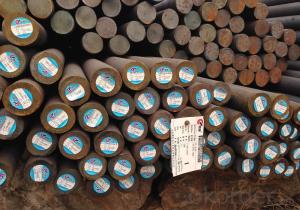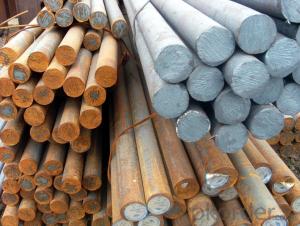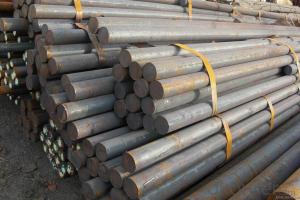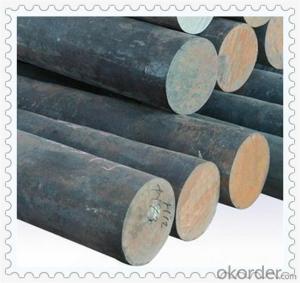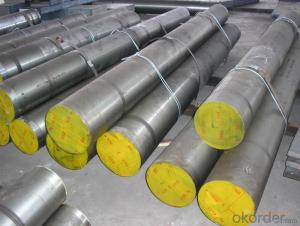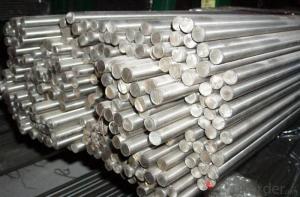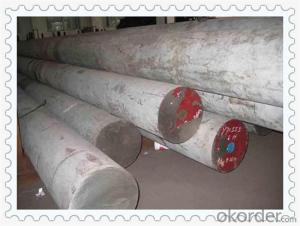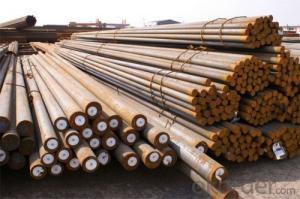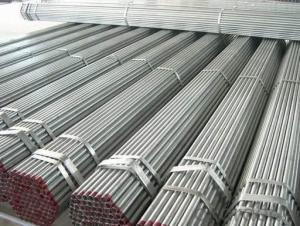Aisi 4140 Alloy steel Mould Steel Round Bar
- Loading Port:
- China main port
- Payment Terms:
- TT or LC
- Min Order Qty:
- 25 m.t.
- Supply Capability:
- 10000 m.t./month
OKorder Service Pledge
OKorder Financial Service
You Might Also Like
Specification
The details of our Steel
1. Produce Standard: as the GB, AISI, ASTM, SAE, EN, BS, DIN, JIS Industry Standard
2. Produce processes: Smelt Iron -EAF smelt Billet - ESR smelt Billet -Hot rolled or forged get the steel round bar and plate
3. Heat treatment:
Normalized / Annealed / Quenched+Tempered
4. Quality assurance:
All order we can received Third party inspection, You can let SGS, BV,.. and others test company test and inspect our products before Goods shipping.
Product information
1.Chemical Composition(%)
C Si Mn P S Cr Ni Mo |
0.42 0.30 0.60 ≤0.025 ≤0.025 1.00 ≤ 0.25 0.20 |
2.Equivalent Grades
Alloy Steel 4140\ DIN 42CrMo4\1.7225\SCM440
3.Heat treatment
Normalized / Annealed / Quenched / tempered
4.Delivery condition
Hot forged, black sur face or Turned (optional) , rough machined(optional)
5.Certification
ISO9001:2008;SGS Test;Mill Certificate Test
6.Tempering
Heating to 550 - 650 ° C and maintenance regime, again depending on the mechanical
Product show

Workshop show

- Q: Can special steel be used in the power transmission industry?
- Yes, special steel can be used in the power transmission industry. Special steel alloys, such as high-strength and corrosion-resistant varieties, are often used to manufacture components like gears, shafts, and bearings in power transmission systems. These special steels offer improved durability, increased load capacity, and better resistance to wear and fatigue, making them suitable for the demanding conditions of the power transmission industry.
- Q: How does special steel contribute to the heavy equipment industry?
- Special steel contributes to the heavy equipment industry by offering enhanced strength, durability, and resistance to wear and tear. It enables the production of high-performance components and parts, such as gears, axles, and blades, that can withstand heavy loads, extreme temperatures, and harsh environments. The use of special steel in heavy equipment ensures improved safety, increased productivity, and longer service life, making it a critical material for the industry.
- Q: What are the different methods of preventing pitting corrosion in special steel?
- There are several methods available to prevent pitting corrosion in special steel. These techniques aim to protect the steel surface from the corrosive environment and inhibit the formation of pits. Some of the commonly used methods include: 1. Passivation: Passivation involves treating the steel surface with a chemical solution or coating to create a protective oxide layer. This layer acts as a barrier, preventing the penetration of corrosive agents and reducing the risk of pitting corrosion. 2. Alloying: By adding specific alloying elements to the steel composition, its resistance to corrosion can be improved. Elements such as chromium, nickel, and molybdenum are often used as they enhance the steel's ability to form a stable passive film and resist pitting corrosion. 3. Cathodic protection: This method involves using a sacrificial anode or applying an impressed current to the steel surface. By making the steel cathodic, it becomes less susceptible to corrosion as electrons are drawn away from it, preventing the formation of pits. 4. Coatings: Applying a protective coating to the steel surface can effectively prevent pitting corrosion. Coatings such as paint, epoxy, or polymer-based materials act as a physical barrier, shielding the steel from corrosive agents. 5. Environmental control: Controlling the environment surrounding the steel can also help prevent pitting corrosion. This includes measures such as regulating temperature, humidity, and pH levels to ensure they are within acceptable limits and inhibiting the corrosion process. 6. Regular maintenance: Regular inspection and maintenance of the steel surface are crucial for preventing pitting corrosion. Any signs of damage or deterioration should be addressed promptly to prevent further corrosion and potential pitting. It is important to note that the choice of prevention method depends on various factors such as the specific steel composition, the corrosive environment, and the intended application. Proper selection and implementation of these methods can significantly enhance the resistance of special steel to pitting corrosion, ensuring its longevity and performance.
- Q: What are the different alloying elements used in special steel?
- There are several different alloying elements used in special steel, including chromium, nickel, molybdenum, vanadium, tungsten, cobalt, and manganese. These elements are added in varying amounts to enhance the steel's properties such as strength, corrosion resistance, hardness, and heat resistance.
- Q: How is special steel used in the medical industry?
- Special steel is used in the medical industry for a variety of applications. It is commonly used in the production of surgical instruments, implants, and medical devices due to its exceptional strength, durability, and resistance to corrosion. Special steel ensures that these instruments and implants can withstand the harsh conditions of medical procedures and maintain their integrity over time, ensuring better patient outcomes.
- Q: How is special steel stored and transported?
- Special steel is typically stored and transported in a controlled environment to ensure its quality and prevent any damage or contamination. It is stored in covered warehouses or facilities equipped with proper ventilation, humidity control, and temperature regulation. Additionally, special steel is often stored on racks or shelves to prevent direct contact with the ground and minimize the risk of corrosion. When it comes to transportation, special steel is usually transported in specially designed containers or crates, ensuring protection from external elements and providing secure handling during transit.
- Q: How does the heat treatment process affect the properties of special steel?
- The properties of special steel are greatly affected by the heat treatment process. This process involves controlled heating and cooling of the steel to modify its microstructure and, as a result, its mechanical properties. To begin, heat treatment can increase the hardness of special steel. By heating the steel to a specific temperature and then rapidly cooling it through quenching, the steel undergoes a phase transformation that boosts its hardness. This is especially advantageous for applications that demand high strength and resistance to wear, such as cutting tools or bearings. Furthermore, heat treatment can enhance the toughness of special steel. By tempering the quenched steel at a lower temperature, the brittleness caused by rapid cooling can be minimized, leading to improved toughness and ability to withstand impacts. This is crucial in applications where the steel must endure sudden shocks or impacts, like in automotive or aerospace components. Moreover, heat treatment can also improve the overall strength of special steel. Through a combination of heating, cooling, and tempering processes, the steel's grain structure can be refined, resulting in increased strength and resistance to deformation. This is particularly critical for structural applications where the steel must withstand heavy loads or extreme conditions. Additionally, the heat treatment process can influence the corrosion resistance of special steel. By subjecting the steel to specific heat treatment cycles, the formation of certain phases or chemical compounds can be encouraged, leading to enhanced resistance against corrosion or oxidation. This is essential for applications exposed to harsh environments or corrosive substances, such as in marine or chemical industries. In conclusion, the heat treatment process is essential in modifying the properties of special steel. By carefully controlling the heating, cooling, and tempering cycles, the hardness, toughness, strength, and corrosion resistance of the steel can be significantly improved. This allows for the production of special steel with customized properties to meet the specific requirements of various industrial applications.
- Q: How is special steel used in the manufacturing of tools and dies?
- Due to its exceptional properties, special steel is widely utilized in the production of tools and dies. Also known as tool steel, special steel is specifically engineered to possess high hardness, wear resistance, toughness, and heat resistance. When it comes to tool manufacturing, such as drills, saws, hammers, and chisels, special steel is employed to guarantee durability and prolonged tool lifespan. The high hardness of special steel enables these tools to endure the demands of cutting, drilling, and shaping without easily becoming dull or deformed. Moreover, the wear resistance of special steel ensures that these tools can maintain their sharp cutting edges for an extended period, reducing the need for frequent sharpening or replacement. Furthermore, in the manufacture of dies used in various manufacturing processes, special steel plays a vital role. Dies are utilized to shape materials into specific forms or sizes, such as in forging, stamping, or extrusion processes. Thanks to the high toughness of special steel, dies can withstand the high pressure and impact forces involved in these processes without cracking or fracturing. Additionally, the heat resistance of special steel ensures that dies can endure the elevated temperatures generated during these operations without losing their shape or hardness. Special steel also possesses excellent machinability, making it easy to shape and form into intricate tool and die designs. This quality holds great significance in manufacturing, as it allows for the production of precise and intricate tools and dies, resulting in improved product quality and efficiency. Overall, special steel is a crucial material in the production of tools and dies due to its outstanding hardness, wear resistance, toughness, heat resistance, and machinability. These properties guarantee the durability, prolonged tool lifespan, and high performance of tools and dies, thus contributing to the overall efficiency and quality of various manufacturing processes.
- Q: What are the specific requirements for special steel used in the railway track industry?
- The specific requirements for special steel used in the railway track industry include high strength, durability, and resistance to wear, fatigue, and corrosion. It must also possess good weldability and maintain its mechanical properties under varying temperatures and loading conditions. Additionally, the steel should comply with specific industry standards and undergo rigorous testing and quality control measures to ensure its reliability and safety for railway track applications.
- Q: What are the different surface coatings applied to special steel?
- There are several different surface coatings that can be applied to special steel in order to enhance its performance and protect it from various environmental factors. Some of the common surface coatings include: 1. Galvanizing: This is a process in which a layer of zinc is applied to the surface of the steel. It provides excellent corrosion resistance and protects the steel from rusting. 2. Powder coating: This is a technique where a dry powder is electrostatically sprayed onto the steel surface and then cured under heat. It creates a hard, durable, and decorative coating that offers excellent resistance to impact, abrasion, and corrosion. 3. Paint coating: Steel can be coated with various types of paints, including epoxy, acrylic, polyurethane, and enamel. These coatings not only enhance the appearance of the steel but also provide protection against corrosion and weathering. 4. Chrome plating: This process involves electroplating a thin layer of chromium onto the steel surface. It provides excellent resistance to corrosion, wear, and abrasion, making it suitable for applications where the steel is exposed to harsh environments. 5. Ceramic coating: Ceramic coatings are applied through thermal spraying or plasma spraying methods. These coatings offer high-temperature resistance, abrasion resistance, and excellent thermal insulation properties, making them suitable for applications in industries such as aerospace and automotive. 6. Anodizing: This process is commonly used for aluminum, but it can also be applied to certain types of special steel. It involves creating an oxide layer on the surface of the steel through an electrochemical process. Anodizing provides enhanced corrosion resistance and can also be used for decorative purposes. These are just a few examples of the different surface coatings that can be applied to special steel. The choice of coating depends on the specific requirements of the application, including factors such as corrosion resistance, wear resistance, temperature resistance, and aesthetic appearance.
Send your message to us
Aisi 4140 Alloy steel Mould Steel Round Bar
- Loading Port:
- China main port
- Payment Terms:
- TT or LC
- Min Order Qty:
- 25 m.t.
- Supply Capability:
- 10000 m.t./month
OKorder Service Pledge
OKorder Financial Service
Similar products
Hot products
Hot Searches
Related keywords
